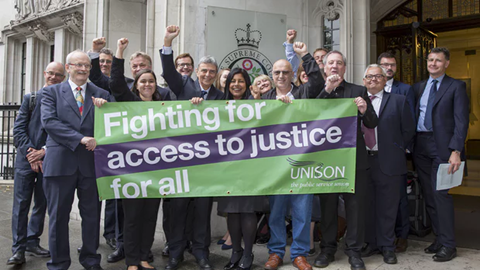In a humiliating reverse to its justice policies this morning, the government announced the abolition of employment tribunal fees after the Supreme Court ruled them unlawful.
The surprise ruling by seven justices overturned judgments by the High Court in 2013 and the Court of Appeal in 2015. Instead the justices unanimously backed an appeal by trade union Unison which argued that the fees were introduced unlawfully. The Law Society described the decision as 'an urgently needed wake-up call’.
Tribunal fees were introduced in July 2013 by a fees order made by then lord chancellor Chris Grayling. They started at around £160, and increased to between £230 and £950 for further hearings. For certain claims claimants had to pay up to £1,200.
Unison claimed that the fees prevented thousands of employees, particularly those on low incomes, from getting justice if they are badly treated by their employers. The case also asked whether fees breached the EU law principle of effectiveness, and whether the policy was indirectly discriminatory, claims which the Supreme Court backed up.
Reacting to the judgment, Law Society president Joe Egan said: ‘These fees placed an insurmountable barrier in the way of tens of thousands of people. Access to justice is a fundamental right – if you can’t enforce your rights then it renders them meaningless. Today’s decision will serve as an urgently needed wake-up call - justice must never be a luxury for those who can afford it, it is a right we all share.’
Gillian Guy, chief executive of Citizens Advice, said the ruling should mark an end to tribunal fees standing in the way of people upholding their employment rights. ‘People’s employment rights are only as good as their ability to enforce them. Employment tribunal fees have prevented people from getting justice when they’ve been treated unfairly at work,’ she added.
Claire Dawson, head of employment at national firm Slater and Gordon, said: ’This is a great outcome for employees and workers who have in recent years been discouraged from pursuing potentially viable claims because of the fees payable.’
In a statement following the judgment, justice minister Dominic Raab said: ’In setting employment tribunal fees, the government has to consider access to justice, the costs of litigation, and how we fund the tribunals.
’The Supreme Court recognised the important role fees can play, but ruled that we have not struck the right balance in this case. We will take immediate steps to stop charging fees in employment tribunals and put in place arrangements to refund those who have paid. We will also further consider the detail of the judgment.’ The refund is expected to cost around £32 million.
Beverley Sunderland, managing director, Crossland Employment Solicitors, predicted that the government’s next move will be to try and introduce legislation to properly impose fees.
’But, as they do not have a majority and given the clear and unequivocal statistics of the impact of fees on the numbers of claims brought, it is difficult to see how any such legislation will get through parliament as no MP, whatever their politics, is likely to vote for it,’ she added.
Diane Gilhooley, head of the global HR group at Eversheds Sutherland, echoed those thoughts and said the government would likely try to move quickly to put in place a ’more proportionate replacement fees scheme’.
‘As for those who have already paid tribunal fees, the MoJ has undertaken to reimburse fees already paid. What is not yet clear, however, is whether that undertaking extends to compensating employers who have been ordered by tribunals to reimburse fees paid by claimants,’ she added.
Matthew Hodson, associate in the employment team at London firm Waterfront Solicitors, said: ‘I expect many practitioners will be now be advising employees who are bringing lower value breach of contract claims to commence employment tribunal proceedings as opposed to starting a claim in the Small Claims Court.
He added: ‘We also expect our employer clients to face greater difficulty in reaching an early conciliation settlement given employees will now have less of a deterrent to commence employment tribunal proceedings’.
Emma Bartlett, partner at Charles Russell Speechlys, said: 'For claimants who might have not brought claims because of the cost of the fee, many may now take legal advice on prospects of seeking an extension of time to bring their claims. Some employers may now not utilise the ACAS early conciliation period in the same way; those employers that were playing a “long game” and waiting to see if the employee would start a claim before entertaining the notion of conciliating might be prepared to engage earlier.’
Unison was represented by Dinah Rose QC of Blackstone Chambers instructed by its in-house legal solicitor Shantha David, while the lord chancellor was represented by David Barr QC, of Temple Garden Chambers.
Worth noting #ETfees only brought in £11.6m to MoJ in 2016/17. Hardly worth all this fuss anyway.
— John Hyde (@JohnHyde1982) 26 July 2017
Employment tribunal claims fell 70% after fees introduced. Thousands were denied access to justice by an unlawful policy. #ETfees
— John Hyde (@JohnHyde1982) 26 July 2017
£32million to be repaid to Claimant’s who incurred Employment Tribunal fees. Huge blow to Government and bittersweet compensation to many
— Kevin Poulter (@kevinpoulter) 26 July 2017




























66 Readers' comments